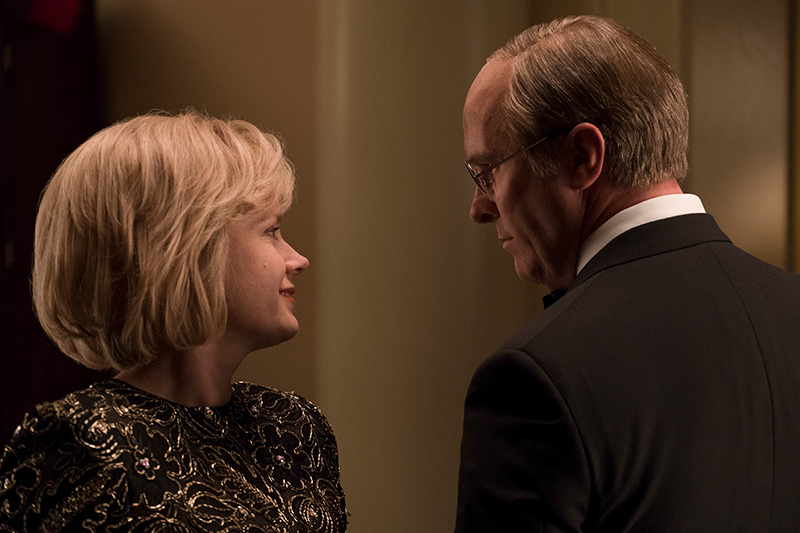Vice
Rarely have I seen a film that hates its audience as much as Vice does. Poised as a satire on the rise of former Vice President Dick Cheney, Adam McKay’s supremely misguided biopic is tantamount to yelling fire in a theater and then locking the doors. It isn’t just ugly, unfunny and stunningly mediocre, it’s the worst film of the year.

(L-R) Amy Adams and Christian Bale as Lynne and Dick Cheney in Annapurna Pictures' VICE.

Rarely have I seen a film that hates its audience as much as Vice does. Poised as a satire on the rise of former Vice President Dick Cheney, Adam McKay’s supremely misguided biopic is tantamount to yelling fire in a theater and then locking the doors. It isn’t just ugly, unfunny and stunningly mediocre, it’s the worst film of the year.
A title card comes up saying:
“The following is a true story. Or as true as it can be given that Dick Cheney is known as one of the most secretive leaders in recent history. But we did our fucking best.”
This precursor, a cinematic excuse for everything that you’re about to see, is a cheap imitation of any real storytelling. It’s the self-conscious Cliff’s Notes of filmmaking. One of the great successes of McKay’s Oscar-winning film, The Big Short, was taking an extraordinarily difficult situation to explain (the 2008 housing crisis) and make it digestible and even, yes, entertaining. While there were cheap flourishes and cheeky cameos, it did more good than harm in how it didn’t simply showed the true level of greed but how it was accomplished.
Vice starts back in Cheney’s twenties. As a slovenly drunk loser with no job aspects or aspirations, he (Christian Bale) has but the love of a good woman in Lynne (Amy Adams). Christian Bale has pretty much perfected the deep method of the characters he portrays but he never sold me here. I saw him thinking about every move, gesture, voice modulation. This wasn’t a disappearance, it was a puppet show. Amy Adams fares better. As a wife who didn’t spend a lot of time in front of the camera, Adams has more breathing room for interpretation with the supportive wife role, even if as written it’s nothing more than that. For a film that throws in everything but the kitchen sink, why not include her dalliance as a writer of historical lesbian fiction? McKay wants to position her with Lady Macbeth tones – underlining, bolding and italicizing it with a literal scene of Shakespearean dialogue – but it never quite lands.
While Bale and Adams are locked and loaded in their very serious undertakings, Sam Rockwell as George W. Bush and Steve Carell as Donald Rumsfeld are in a completely different movie entirely, one more akin to McKay’s earlier doofus comedies like Talladega Nights and Step Brothers. They’re both pure cartoons. LisaGay Hamilton as Condoleezza Rice, Alison Pill and Lily Rabe as Mary and Liz Cheney are are serviceable. Tyler Perry as Colin Powell is…a choice. The film’s framing device involving Jesse Plemons (Fargo, Black Mirror) is painful at best. I won’t say any more on that.
McKay tries, desperately, to connect the dots between Cheney and the rise of Roger Ailes and Fox News to our current administration as if he was a MAGA Forrest Gump, sewing history with the seeds of extreme right politics. To be sure, that’s exactly what Cheney did but as presented, in quick jabs and smash cuts like a 1970s TV show, just as we start to understand how one man essentially turned the government in on itself, we’re off to the next vignette. Each of these sequences is treated with so much winking the whole movie chugs along with its eyes closed. We never see a process here.
Cheney jumps from DUIs to White House intern after a stern talking to by Lynne. He bops from position to position with sometimes nothing more than a single line of exposition or a title card. For most of us who grew up or were adults during any of his diabolical reign in the U.S. know that he was a shadowy figure of American politics; the man behind the curtain of trillion dollar wars and 100K+ death tolls. But it’s as if McKay is afraid to go any deeper and lose the dynamic and energy that made The Big Short such a success. What could have been an exploration of one of the world’s greatest ‘falling upward’ stories and opportunity to root Cheney’s greed and avarice in something more than ‘hrrmmphs’ and groans by Bale (at one point he actually sounds like he’s using his Batman voice) is wasted, which is quite something in a 132-minute film.
What he does instead is let Cheney break the fourth wall to finger wag at the audience. Is it out of liberal guilt? Cheney tears into the audience for letting him happen as if he listened to “Look What You Made Me Do” too many times. It’s a moment for the Twitter era, for sure.
If you’re able to stay for the truly awful mid-credits sequence though – one that I can only describe as masturbating with your own tears as lube – then you can revel in a level of diabolical cynicism that’s directed at everyone. I suppose it’s McKay’s flip of ‘there were good people on both sides’ except it’s condemning everyone.
Erik Anderson is the Founder and Editor-in-Chief of AwardsWatch.